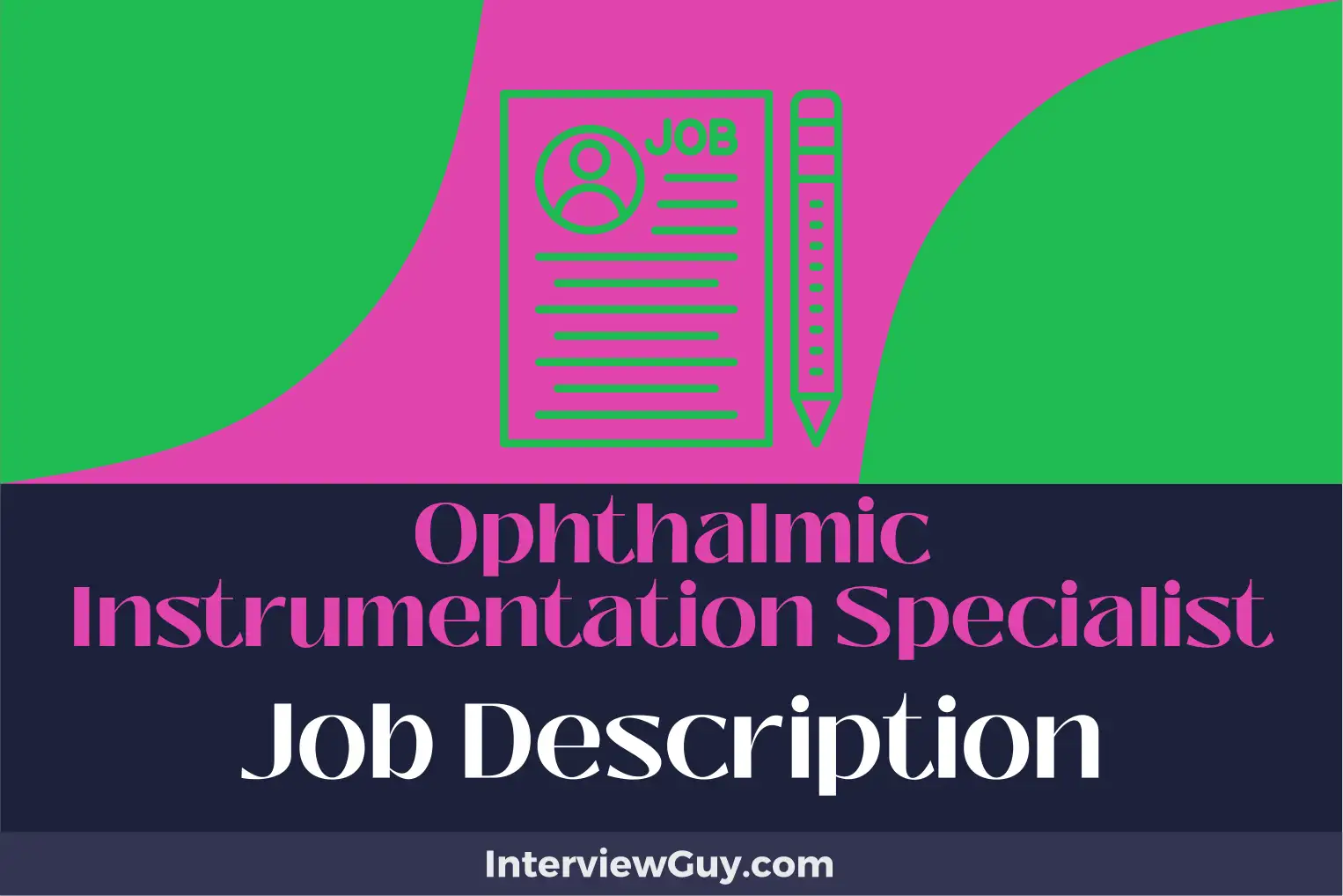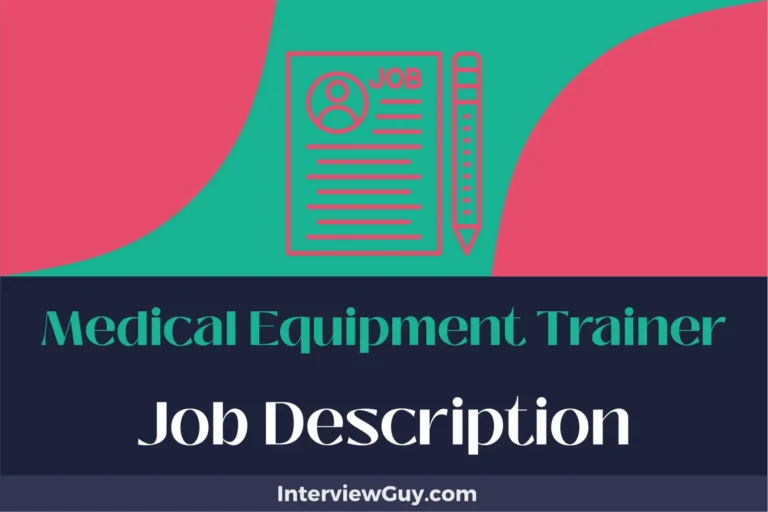Ophthalmic Instrumentation Specialist Job Description [Updated for 2026]

In the era of ever-advancing medical technologies, the importance of an Ophthalmic Instrumentation Specialist has never been more prominent.
As healthcare technologies evolve, the demand for skilled professionals who can proficiently operate, maintain, and safeguard our ophthalmic instruments continues to grow.
But what does it really mean to be an Ophthalmic Instrumentation Specialist?
Whether you are:
- A job seeker trying to understand the intricacies of this role,
- A hiring manager outlining the perfect candidate,
- Or simply interested in the ins and outs of ophthalmic instrumentation,
You’ve come to the right place.
Today, we present a customizable Ophthalmic Instrumentation Specialist job description template, designed for effortless posting on job boards or career sites.
Let’s dive right in.
Ophthalmic Instrumentation Specialist Duties and Responsibilities
Ophthalmic Instrumentation Specialists are highly skilled professionals who are responsible for operating, maintaining, and managing various ophthalmic instruments and equipment to support eye care professionals and eye patients.
They have the following duties and responsibilities:
- Operate and maintain various ophthalmic instruments, including but not limited to retinoscopes, slit lamps, tonometers, and other diagnostic equipment
- Assist ophthalmologists during examinations and surgical procedures by preparing and managing the necessary equipment
- Perform regular checks and maintenance on ophthalmic instruments to ensure optimal performance and functionality
- Train other healthcare staff in the proper use and handling of ophthalmic instruments
- Conduct calibration of instruments to ensure accurate measurements and results
- Ensure the cleanliness and sterilization of instruments according to set health and safety standards
- Assist in the ordering and procurement of new ophthalmic instruments or equipment
- Document and report any issues or malfunctions of the equipment to the appropriate personnel
- Stay updated with advancements in ophthalmic technology and equipment
Ophthalmic Instrumentation Specialist Job Description Template
Job Brief
We are seeking a dedicated Ophthalmic Instrumentation Specialist to manage, maintain, and operate a variety of ophthalmic instruments in our healthcare facility.
Responsibilities include calibrating and troubleshooting ophthalmic equipment, ensuring equipment is clean and safe for use, and providing technical assistance to ophthalmologists during procedures.
The ideal candidate will possess a keen eye for detail, a strong understanding of ophthalmic instruments, and the ability to work efficiently in a fast-paced environment.
Responsibilities
- Maintain and calibrate ophthalmic instruments to ensure optimal performance.
- Provide technical assistance to ophthalmologists during procedures.
- Conduct regular inspections of instruments for safety and cleanliness.
- Coordinate with equipment suppliers for routine service and repairs.
- Train staff on the proper use and care of ophthalmic instruments.
- Stay updated on the latest advancements in ophthalmic technology.
- Document and maintain accurate records of instrument usage and maintenance.
- Comply with healthcare regulations and standards.
Qualifications
- Proven experience as an Ophthalmic Instrumentation Specialist or similar role.
- Knowledge of various ophthalmic instruments and their operation.
- Ability to troubleshoot and repair ophthalmic equipment.
- Excellent communication and interpersonal skills.
- High attention to detail and accuracy.
- Ability to work in a fast-paced, high-pressure environment.
- Completion of an accredited Ophthalmic Technician program is preferred.
- Professional certification from the Joint Commission on Allied Health Personnel in Ophthalmology (JCAHPO) is a plus.
Benefits
- 401(k)
- Health insurance
- Dental insurance
- Vision insurance
- Retirement plan
- Paid time off
- Professional development opportunities
Additional Information
- Job Title: Ophthalmic Instrumentation Specialist
- Work Environment: Healthcare facility. This position may require working evenings, weekends, and holidays.
- Reporting Structure: Reports to the Director of Ophthalmology or other designated supervisor.
- Salary: Salary is based upon candidate experience and qualifications, as well as market and business considerations.
- Pay Range: $50,000 minimum to $70,000 maximum
- Location: [City, State] (specify the location)
- Employment Type: Full-time
- Equal Opportunity Statement: We are an equal opportunity employer and value diversity at our company. We do not discriminate on the basis of race, religion, color, national origin, gender, sexual orientation, age, marital status, veteran status, or disability status.
- Application Instructions: Please submit your resume and a cover letter outlining your qualifications and experience to [email address or application portal].
What Does an Ophthalmic Instrumentation Specialist Do?
Ophthalmic Instrumentation Specialists work primarily in the healthcare sector, specifically in ophthalmology departments, eye clinics, and specialized eyecare centers.
Their main responsibility is to operate, maintain, and repair ophthalmic instruments and equipment used to diagnose and treat eye-related issues.
This includes a wide range of devices such as visual field analyzers, tonometers, slit lamps, fundus cameras, and retinal imaging devices.
Ophthalmic Instrumentation Specialists work closely with ophthalmologists, optometrists, and other eyecare professionals, aiding them in conducting eye examinations, diagnosing eye disorders, and performing eye surgeries.
They are responsible for calibrating the equipment accurately to ensure precise measurements and reliable results.
Additionally, they may provide training to other healthcare staff on the correct usage of these instruments and participate in the evaluation and acquisition of new ophthalmic equipment.
Furthermore, an Ophthalmic Instrumentation Specialist may also be involved in developing and implementing policies for equipment use and maintenance to ensure compliance with regulatory standards and to maintain a safe and clean work environment.
Ophthalmic Instrumentation Specialist Qualifications and Skills
An Ophthalmic Instrumentation Specialist should have the skills and qualifications that align with your job description, such as:
- Technical knowledge of ophthalmic instruments, their maintenance, calibration and operation.
- Analytical skills to troubleshoot and solve equipment issues and perform testing on ophthalmic devices.
- Interpersonal and communication skills to effectively interact with healthcare professionals, patients, and vendors.
- Detail-oriented with the ability to accurately document instrument readings and patient information.
- Customer service skills to provide support and guidance to patients and ophthalmic professionals regarding instrument use.
- Physical abilities to handle and operate delicate and complex ophthalmic instruments.
- Ability to work under pressure and manage multiple tasks, maintaining accuracy and efficiency.
- Knowledge of safety standards and procedures in a healthcare setting.
Ophthalmic Instrumentation Specialist Experience Requirements
Entry-level Ophthalmic Instrumentation Specialists usually require at least 1-2 years of experience in the field.
This experience is often gained through internships, part-time roles or positions in eye care clinics, hospitals or ophthalmic device companies.
It is also beneficial to have experience with the specific instruments used in ophthalmology, such as tonometers, ophthalmoscopes, and fundus cameras.
Candidates with 3-5 years of experience in this field have likely honed their technical skills and knowledge of ophthalmic instruments.
At this level, they are expected to be proficient in the operation, maintenance, and repair of ophthalmic instruments.
Those with more than 5 years of experience have extensive knowledge of the instruments used in ophthalmology and may have some leadership experience.
These professionals are typically responsible for training others on how to use ophthalmic instruments and may take on managerial or supervisory roles in the ophthalmology department.
In addition, certifications from recognized bodies like the Joint Commission on Allied Health Personnel in Ophthalmology (JCAHPO) can be beneficial, and may even be a requirement in some positions.
These certifications demonstrate a high level of competence and expertise in the field of ophthalmic instrumentation.
Ophthalmic Instrumentation Specialist Education and Training Requirements
An Ophthalmic Instrumentation Specialist typically requires a high school diploma or equivalent as a basic educational requirement.
However, an associate’s or bachelor’s degree in a related field like ophthalmic technology or healthcare is often preferred by employers.
These professionals must complete an accredited program in Ophthalmic Medical Technology, which provides theoretical and practical training in the use, care, and basic maintenance of ophthalmic instruments.
These programs usually last two years and lead to an Associate of Applied Science degree.
Licensure is not universally required for Ophthalmic Instrumentation Specialists, but some states do require it.
The criteria for licensure often involve graduation from an accredited program and passing an exam.
Certification, while not always required, is highly recommended.
The Joint Commission on Allied Health Personnel in Ophthalmology (JCAHPO) offers certification at three levels: Certified Ophthalmic Assistant (COA), Certified Ophthalmic Technician (COT), and Certified Ophthalmic Medical Technologist (COMT).
Ongoing education is essential for Ophthalmic Instrumentation Specialists, as they need to keep up with advancements in ophthalmic technology and care techniques.
Continuing education can also pave the way for career advancement and higher-level certification.
Ophthalmic Instrumentation Specialist Salary Expectations
An Ophthalmic Instrumentation Specialist can expect to earn an average salary of $64,000 (USD) per year.
However, the actual earnings can greatly differ based on the level of experience, specialization, location, and the size of the employing healthcare institution.
Ophthalmic Instrumentation Specialist Job Description FAQs
What qualifications does an Ophthalmic Instrumentation Specialist need?
An Ophthalmic Instrumentation Specialist should have a minimum of an associate degree in ophthalmic technology or a related field.
They should also have certification from a recognized body such as the Joint Commission on Allied Health Personnel in Ophthalmology (JCAHPO).
Prior experience in an ophthalmic setting could also be beneficial.
What are the daily duties of an Ophthalmic Instrumentation Specialist?
On a typical day, an Ophthalmic Instrumentation Specialist might calibrate, maintain, and repair ophthalmic instruments.
They could be responsible for operating advanced equipment during patient examinations, assisting ophthalmologists during procedures, and training other staff in the use of ophthalmic equipment.
They may also keep inventory of equipment and supplies, and ensure compliance with safety and hygiene protocols.
What qualities make a good Ophthalmic Instrumentation Specialist?
A good Ophthalmic Instrumentation Specialist should have strong technical skills and attention to detail to ensure equipment is properly maintained and calibrated.
They should also have good hand-eye coordination and dexterity to operate intricate machinery.
Good interpersonal and communication skills are also important as they often interact with patients and other healthcare professionals.
Is it difficult to hire an Ophthalmic Instrumentation Specialist?
Hiring for this role can be challenging due to the specialized nature of the position.
Candidates with the necessary technical skills and certifications may not be plentiful.
To attract qualified candidates, employers may need to offer competitive compensation and benefits, opportunities for career advancement, and a supportive work environment.
What should you look for in an Ophthalmic Instrumentation Specialist resume?
When reviewing a resume for this role, look for a relevant educational background and any certifications related to ophthalmic technology.
Also, check for experience with specific ophthalmic instruments and procedures.
Any additional experience in a healthcare setting, especially patient-facing roles, would be a plus.
Conclusion
And so, we conclude.
Today, we’ve shed light on the multifaceted and crucial role of an ophthalmic instrumentation specialist.
Surprise, surprise?
It’s not just about operating complex equipment.
It’s about ensuring clear vision and improving the quality of life, one patient at a time.
With our comprehensive ophthalmic instrumentation specialist job description template and practical examples, you’re ready to take a leap.
But why halt your stride?
Immerse yourself further with our job description generator. It’s your next stride towards creating detailed job listings or refining your resume to sheer precision.
Always remember:
Every patient interaction is a chance to make a lasting impact.
Let’s pave the way to clearer futures. Together.
How to Become an Ophthalmic Instrumentation Specialist (Complete Guide)
Human Over Hardware: Careers That AI Can’t Conquer
The Work Less Ordinary: Unusual Jobs That Excite
Work and Wander: High-Paying Remote Jobs for the Adventurous Soul!
Where Every Task is a Risk: The Thrill and Terror of Dangerous Jobs

![Game Theorist Job Description [Updated for 2026]](https://interviewguy.com/wp-content/uploads/2024/07/game-theorist-job-description-768x512.webp)

![Childcare Coordinator Job Description [Updated for 2026]](https://interviewguy.com/wp-content/uploads/2024/05/childcare-coordinator-job-description-768x512.webp)

![Event Equipment and Party Supplies Transporter Job Description [Updated for 2026]](https://interviewguy.com/wp-content/uploads/2024/07/event-equipment-and-party-supplies-transporter-job-description-768x512.webp)
![Embedded Systems Engineer Job Description [Updated for 2026]](https://interviewguy.com/wp-content/uploads/2024/05/embedded-systems-engineer-job-description-768x512.webp)